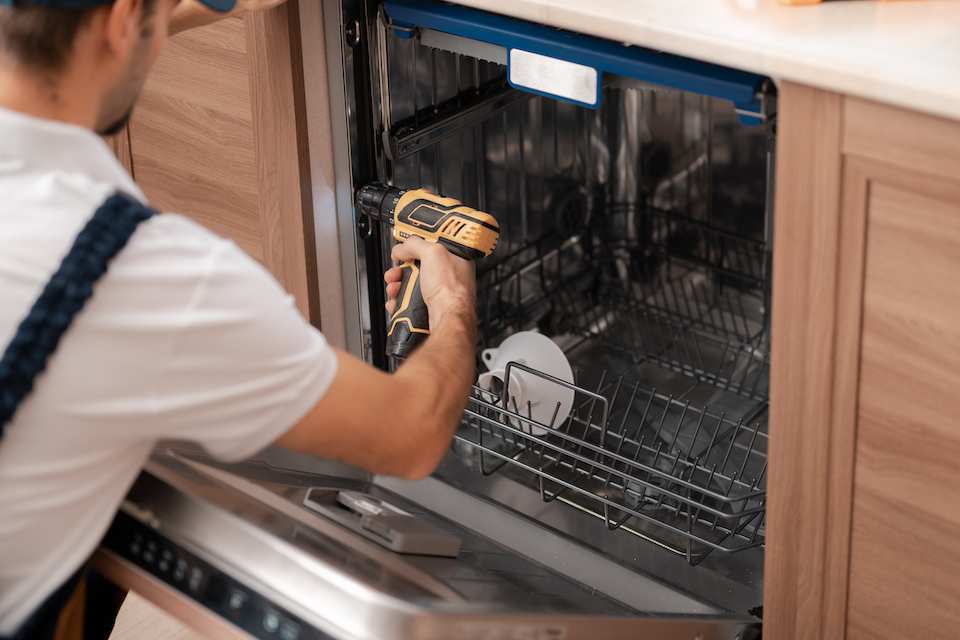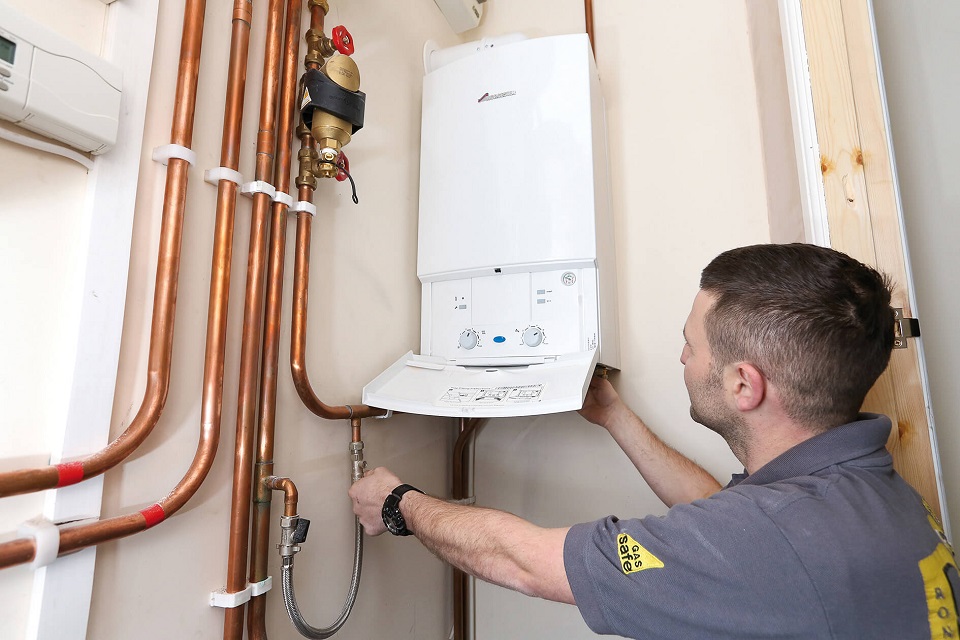How Much Does Dishwasher Installation Cost in 2025?
Considering the cost of both purchasing a dishwasher and installing one, the average cost for a domestic dishwasher is between £350 to £1,100 in total.
This range would apply whether it be a freestanding dishwasher, built-in dishwasher, or a commercial dishwasher.
However, some dishwasher units are far more expensive, exceeding the top end value for the installation of a very high-end product or even more expensive for a commercial use.

Let's break this down...
To be more precise, a freestanding dishwasher installation is likely to cost around £400 to £800, £500 to £1,000 for an integrated dishwasher, or £400 to £700 for a slimline dishwasher. The cost reaching about £1,500 to £5,500 when it comes to purchasing a commercial dishwasher.
Cost factors include the size/type of dishwasher, where exactly in the property the dishwasher is being installed, ease of access, number of tradespeople hired, and the location of your property.
Why should location matter?
In regard to the final point, this is because labour costs differ across the UK and, in turn, will shape dishwasher installation prices differently.
Dishwasher Installation Prices
The below is a summary of dishwasher installation costs by dishwasher type (supply cost and labour costs combined).
| Type of Dishwasher | Average Total Cost |
|---|---|
| Slimline | £400 to £700 |
| Freestanding | £450 to £750 |
| Integrated | £600 to £1,000 |
| Commercial | £1,500 to £5,500 |
Labour costs vary depending on how much work is required for installation and where in the UK you live.
- How Much Does Dishwasher Installation Cost in 2025?
- Tradesmen Cost to Install a Dishwasher
- How Long Does It Take to Install a Dishwasher?
- Additional Dishwasher Installation Costs
- How Much Does a New Dishwasher Cost? (Supply Only)
- Dishwasher Price Points
- Types of Dishwashers
- Benefits of Updating Your Dishwasher
- How Much Does Removing a Dishwasher Cost?
- FAQs
Tradesmen Cost to Install a Dishwasher
Labour charges often make up a smaller proportion of the total cost of getting a new dishwasher installed, on the assumption there are no significant adjustments required to the property or water system.
It might be possible to hire a general handyman to install your dishwasher if the pipework is already in place, although it's recommended to ask a professional if any plumbing or electrical wiring is also needed.
However, the cost to install a dishwasher where there wasn't one before will most definitely be higher. This is because you'll need to hire a plumber to install the new pipework.
On average, you should expect the cost of fitting a new dishwasher to range between £40 to £100, depending on where you live and how long the job takes.
How Long Does It Take to Install a Dishwasher?
On average, it takes about an hour to fit a dishwasher, although in some cases, it could take around 1.5 hours or up to two hours. Generally speaking, an hour’s work should be expected.

Time-affecting factors include the size/type of the dishwasher, ease of access, whether an old dishwasher is being removed first, and the number of tradespeople hired. Notably, though, it’s quite likely only one contractor will take on the job.
Additional Dishwasher Installation Costs
There are many added expenses that you may incur along with having a dishwasher fitted.
Let’s take a look at some common examples.
New Electrical Sockets
Most dishwashers require a standard socket nearby. Installing extra electric sockets in your kitchen (on average £80 to £150) could be a useful addition when adding any new appliance. Plus a dedicated electrical socket is the safest option and will void the need of using an extension lead.
If new sockets are required, it is important you check with your electrician to ensure your current system can handle the new load. If not you may need to factor into the cost a fuse board upgrade. Fuse board upgrades cost £325 - £450 depending on how many circuits are required.
Kitchen Worktop Replacement
In order to accommodate any additional work carried out while installing your dishwasher, there may be some surface damage to your worktops during the process. In which case you're usually looking at around £20 to £150 per m2 to replace kitchen worktops, although for luxury materials such as granite prices can reach between £250 and £400 per m2.
New Kitchen Cupboards
If you're carrying out a home refurbishment, then buying new kitchen cupboards will be a great addition to your kitchen. Especially when it comes to boxing in your dishwasher so it naturally blends into its surroundings. Budget around £110 to £145 per cupboard (including installation) or £190 to £355 for solid wood.
How Much Does a New Dishwasher Cost? (Supply Only)
This section explains the cost of supplies needed to install a dishwasher.
Even if you are hiring a professional plumber to do the job, knowing the materials cost can help understand where your money is being spent. This is also helpful if you plan to buy the products yourself and pay just for fitting.
Although, it's also worth noting a plumber may charge more if any significant plumbing modifications are required, such as installing shut-off valves, a new water supply line or modifying pipework. Depending on the complexity of the work, this may add a further £100 to £400 to your installation cost.
On average, a dishwasher is priced at about £200 to £400 for a given unit. However, the price of units can vary from around £150 to as much as £2,100 or maybe even more. As you can see, dishwasher prices could differ greatly.
The supply cost of a freestanding dishwasher is about £200 to £2,000, while it is around £1,000 to £5,000 for a commercial unit, £400 to £1,800 for an integrated dishwasher, or £200 to £700 for a slimline product.
Dishwasher Price Points
| Price Point | Price Range | Benefits |
|---|---|---|
| Budget | £150 – £400 | Basic models with essential functions. Often freestanding or slimline. Suitable for light or occasional use. |
| Mid-Range | £400 – £1,000 | Offers a good balance of performance and features. Includes more efficient integrated units with quieter operation. Ideal for regular home use. |
| High/Premium | £1,000 – £2,100+ | Top-of-the-line models with advanced features, better energy efficiency, quieter operation and sleek designs. Includes some commercial grade options. |
Benefits of Mid-Range Dishwashers
Mid-range dishwashers typically sit around £500 to £800, providing a great balance between cost and features. These models usually offer:
- Quieter operation (low dB rating)
- Better energy and water efficiency
- Adjustable racks with flexible loading
- Extra washing programs and drying options
- Sleek, integrated design options
Benefits of High/Premium Dishwashers
Investing in a higher-end dishwasher can offer:
- Superior cleaning and drying performance
- Smart features including Wi-Fi connectivity, auto-dosing & self-cleaning
- Longer lifespan
- Advanced noise insulation (almost silent)
- Eco-friendly options, reducing water and energy bills
- Luxury designs for seamless integration into modern kitchens
Dishwashers can be bought from various reputable shops, including AO, Hughes, and B&Q. One bonus of paying for a supply-and-fit service is that they may be able to purchase your dishwasher at trade prices, which can save you some money.
Types of Dishwashers
There are various types of dishwashers on the market. It’s important that you choose the right one for you and your property.
Freestanding Dishwasher Cost
These standalone dishwashers can be installed wherever you want on your property so long as it is safe to do so and it has access to drainage and water.
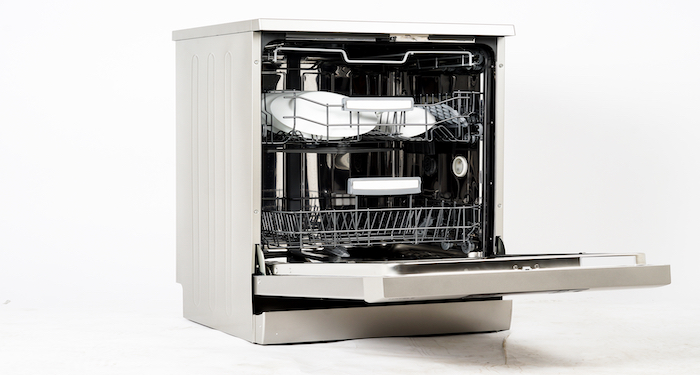
Freestanding dishwashers are quite similar to integrated dishwashers, such as in how they can be hooked up to waste and water supply. However, they have unique sides along with a top cover allowing them to be installed anywhere with the space and safety to allow it.
These dishwashers often cost about £200 to £2,000. If you’re on a budget, this is usually the best type to go with.
Pros
- More freedom in choosing where it can be situated
- It tends to be easier to diagnose issues with these dishwashers
- Generally simpler to install with minimal modifications required
Cons
- Could end up taking more time to pick the right spot
- It can be louder than other dishwasher options
- Not always as aesthetically pleasing as integrated models
Commercial Dishwasher Cost
These dishwashers are generally employed for commercial kitchens and tend to offer more power while being larger too.
While there may be some similarities, installing a commercial dishwasher often comes with a more complex infrastructure compared to a residential unit which may affect the overall cost. They tend to be priced around £1,000 to £5,000.
Pros
- High-end dishwashers
- Perfect for a restaurant kitchens
- Faster wash cycles and higher capacity
Cons
- The actual unit can be quite expensive
- May require specialist installation and regular maintenance
Integrated Dishwasher Cost
If you’re interested in a customised unit, then an integrated dishwasher may be the best way to go. Of course, more work will probably be needed to fit it in place than would be needed with a freestanding dishwasher.
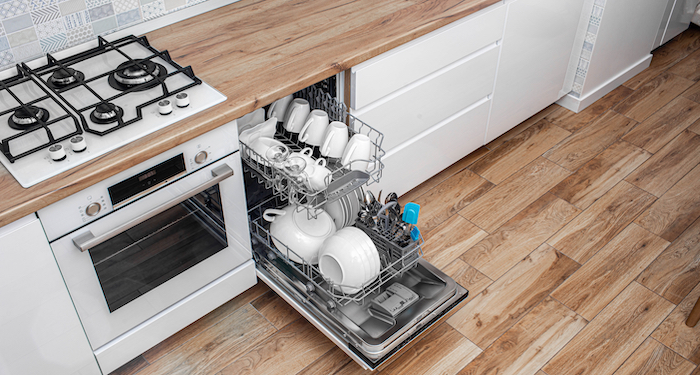
Integrated dishwashers typically lack decorative panels, this is to allow for cabinets to be attached so they integrate with the overall kitchen design. Integrated dishwashers generally cost about £200 to £1,700.
Pros
- Good for customisation
- Blends seamlessly into modern kitchen designs
Cons
- Usually more expensive than freestanding dishwashers
- Less choice as to where they can be installed over freestanding units
Slimline Dishwasher Cost
As you may guess, slimline dishwashers are those that are quite slim in size and are well-suited to small properties or/and those with limited room.
They are usually cheaper than any of the other types discussed here at about £200 to £700 on average per unit. Interestingly, there are small dishwashers out there on wheels that are even portable! So, there are quite a few options to consider here.
However, one of the obvious downsides of slimline dishwashers is, well, that they are small and thus have a more limited capacity. Another type of small dishwasher worth considering is a countertop dishwasher.
Pros
- Relatively cheap
- Great for tight spaces
- Consumes less water and energy
Cons
- Less capacity
- Not ideal for large households or frequent use
Benefits of Updating Your Dishwasher
There are obviously many notable advantages to installing a new dishwasher. Here are some examples.
Improved Quality
Of course, upgrading to a new dishwasher will not only have its benefits, considering that an older unit will have lower quality than when it was initially purchased, and a brand-new dishwasher is also likely to bring higher quality as a new product also.
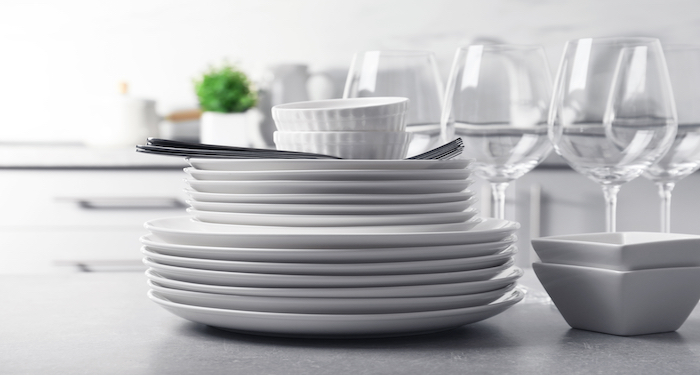
Can Resolve Issues
Some problems may have emerged over the course of your existing dishwasher’s lifespan, so buying a new one can prove a great solution, whether it be that your current machine is not cleaning completely effectively, it’s making strange noises, or water remains following a wash.
How Much Does Removing a Dishwasher Cost?
You may need to simply have a dishwasher removed as you wish to install a new one later or you’ve already installed a new one elsewhere in your property. It should cost about £100 to £200, including waste removal expenses.
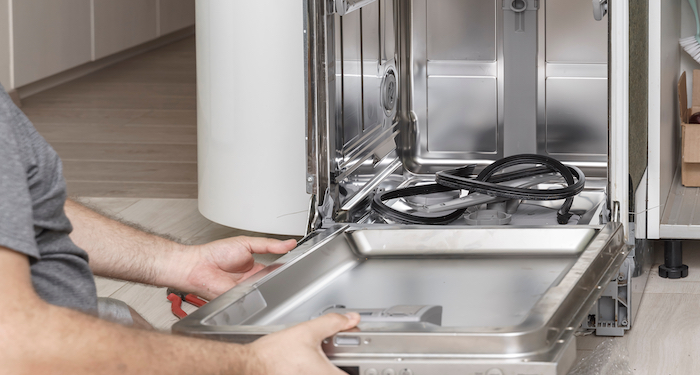
FAQs
Q: How do you clean a dishwasher?
A: One common approach involves grabbing a bowl (one that is safe to put in the dishwasher) and filling it with a cup of white vinegar.
Next, put it at the bottom of an empty dishwasher and run a hot water cycle. This will allow the vinegar to get to work, breaking down food bits, residue, grease, etc.
Q: How do you connect a dishwasher?
A: This will vary greatly from product to product, and if in any doubt, you should hire a professional. Broadly speaking, the installation area should be prepared before the dishwasher (once the old one is removed, if applicable) can be connected to a power source.
Next, the dishwasher can be fitted and connected to the existing water supply.
The sink or a water outlet may be used to drain. The connections should then be checked, such as for leaks, before the machine may be plugged in, and a short water cycle should be used to see that it works correctly.
Once it all looks good, place the machine against the wall, and it’s good to go. Again, this process may differ depending on the specific unit.
Q: How long should a dishwasher last?
A: On average, dishwashers tend to last between 7 and 12 years. Although this can vary depending on the brand, amount of usage and if they've been properly maintained.
Q: What are common signs that a dishwasher should be replaced?
A: Examples include that it is rusting, the door is not locking correctly, water is leaking onto the floor, the dishes are coming out dirty or spotty, water is still present after a wash, or it is beginning to crack.
There are quite a few other signs that may be present also. The more that you notice, the more evident it is that your dishwasher is on the way out.
Q: What are the most common issues I may find with a dishwasher?
A: These include clogged spray arms, blocked filters, or drainage problems. You may also find inlet valve failures can also occur.

